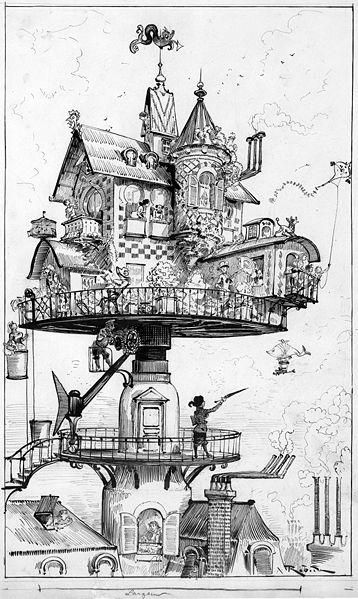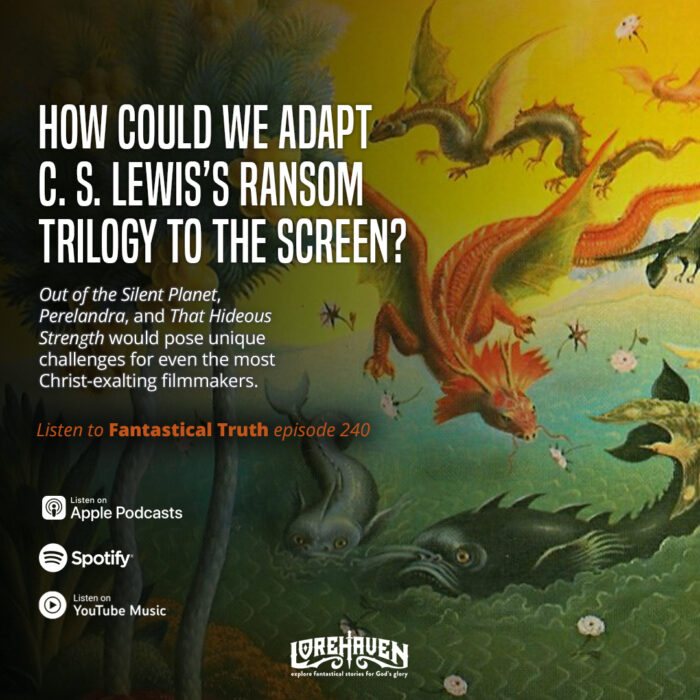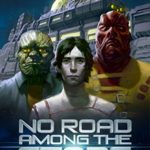The Worldview Of Science Fiction
 As anyone who frequents Spec Faith on a regular basis knows, I’m a fantasy writer. However, I can’t help but notice that science fiction, along with an amalgamation best termed science fantasy, is slowly on the rise.
As anyone who frequents Spec Faith on a regular basis knows, I’m a fantasy writer. However, I can’t help but notice that science fiction, along with an amalgamation best termed science fantasy, is slowly on the rise.
Interestingly, along with this growth, there has arisen a discussion about the predominant worldview of science fiction: is it increasingly conservative?
One noted science fiction writer, Dr. Jerry Pournelle (Fires Of Freedom), said, “Science fiction will always be just a bit out of the mainstream of political thought.” Perhaps, then, since western governmental policy has steadily marched into the liberal camp, science fiction has reacted by taking a turn to the right.
Or has it? The debate seems to be ongoing (see “Is Science Fiction Getting More Conservative?”)
The elements that the anti-left science fiction seem to hold in common are things like individual independence and opposition to bureaucracy. Again from Dr. Pournelle:
Planetary history has shown that vast powerful central bureaucracies don’t generally produce either general welfare or freedom or wealth, and science fiction writers have sort of noticed that — even as welfare liberalism has become a consensus among a large part of the literary elites in academia.
“Welfare liberalism” is an interesting term, and would perhaps describe the beliefs of many science fiction writers of an earlier era. The idea is that the government is to provide for the good of the community even as it protects the liberties of the individual.
On paper it sounds good. Hence, a good many writers have written Utopian fiction (H. G. Wells, Ursula K. Le Guin, Lois Lowry). Others have written “ectopian fiction” revolving around environmental issues or “feminist utopias” dealing with women’s issues.
Writer Sally Miller Gearhart says of the latter:
It contrasts the present world with an idealized society, criticizes contemporary values and conditions, sees men or masculine systems as the major cause of social and political problems (e.g. war), and presents women as equal to or superior to men, having ownership over their reproductive functions. (from “Utopian and dystopian fiction,” Wikipedia
Contrast the above view to that of science fiction writer Larry Correia (Monster Hunter International, Monster Hunter Alpha):
All of us red-staters read books too, and though we are used to being constantly beaten over the head about how everything we believe in is wrong by Hollywood and Manhattan, it is really refreshing for us to be able to be entertained while not being bludgeoned about the dangers of global warming, mean capitalists, or whatever the liberal cause of the day is. There is a huge market of people that just want to be entertained, without being personally slighted, and not to be preached to.
His description of the fiction coming out of “Hollywood and Manhattan” reminded me of Avatar. While that movie attacked conservative political structures (predominantly military and economic), it did not offer a liberal socialist answer but a religious one (panentheism). With its popularity and the coming sequels, I wonder how “conservative” science fiction actually will become.
Couple that with the dystopian fiction that is growing in popularity (The Hunger Games trilogy by Suzanne Collins, Divergent by Veronica Roth), I can’t help but wonder where Christian science fiction fits into this mix.
Your thoughts?












































The first Grandmaster, Robert Heinlein, considered one of the Big Three (along with Isaac Asimov and Arthur C. Clarke), started his writing life from a Liberal perspective but had switched to a more Conservative view by the time he was writing his seminal juvenile novels.
http://en.wikipedia.org/wiki/Robert_A._Heinlein
I’m not sure exactly what worldview the Hunger Games presents, other than “Life can be messy, and governement can be evil.” (With a few more explicatives)
I find it interesting how the government in dystopian stories is often rigorously controlling and invasive (extremely leftist), but yet the authors/filmmakers try to inject them with religious symbolism, trying to portray them as ultra-conservative, religious organizations. Just the other night we watched “Equilibrium”, in which the government has eliminated all emotion and feeling with a drug; the dictator of the society is reverently referred to as “Father”, and his police force are called “clerics”! “V for Vendetta” also comes to mind, with the totalitarian government that hunts down homosexuals. It’s as if dystopian filmmakers are trying to marry extreme social conservatism to extreme political liberalism. It’s interesting, and kind of amusing to me because in the real world that would never work.
I think science-fiction, specifically dystopian, usually screams the merits of small government, but they’re usually looking for the answers in the wrong places. And THAT’s where the Christian science-fiction author comes in. 🙂
Great comment, Bethany.
The thing about the view of government — the liberal political view is often that the conservative is fascist (think Hitler), desiring to dictate to the people what’s good for them.
The truth is, totalitarian governments can have a variety of social, economic, or religious (think Iran and Islamic rule) positions.
But I think you nailed it by saying those looking to fix government are looking in the wrong places.
Becky
My consensus is all fiction should entertain. I’m not really looking for a message, but a good story. Ray Bradbury was the last science fiction I read. I’m mostly into writing fantasy and supernatural, but Christian science fiction is possible.
Why can’t we make a Star Trek-like book where people actually believe in God?
I think the worldview of science fiction depends largely on whom you are talking about. The genre’s too diverse. Jerry Pournelle, Greg Bear, Orson Scott Card, C.S. Lewis, Larry Niven, Robert Heinlein, and John Campbell Jr. were all aligned with the right wing to varying degrees, though usually they were closer to libertarianism than true conservatism (or fascism, in the case of Heinlein). There are plenty of liberal writers in sci-fi (Diane Duane, Joan Vinge, Marge Piercey), but few that are breathtakingly radically leftist . . . Norman Spinrad and Octavia Butler are the only names that come to mind there. I guess it depends on what you mean by leftwing. Science fiction is often anti-religion (though not as often as one might think), and tends to be on the left in regards to social issues, but on economics sci-fi has never leaned significantly to the left. That’s simply a myth. The stable of writers that John Campbell started with were almost all conservative or libertarian – Poul Anderson, H. Beam Piper, Heinlein, Jack Williamson (I think Williamson worked for Campbell). It wasn’t until the sixties and seventies that science fiction even hinted at anti-corporate rhetoric. Today, most of that rhetoric is hollowly produced by corporations themselves (Avatar, for instance). Truly serious critiques of corporations are rare. That’s my take anyway.
By the way, for conservative readers, you may be interested in James Herrick’s Science Fiction Mythologies, an excellent though peeved take on the current state of science fiction, written from a conservative evangelical (I think Reformed) perspective.
I don’t have time for a complete response to this article, but I did want to comment on your listing of “utopias.” I would certainly classify Lowry’s The Giver as a distopia, a cautionary tale on where the surrdenderig of individual freedom for relative government safety might lead. In The Time Machine by HG Wells the world of the future at first seems a paradise, until the Time Traveler learns how truly man has declined from the evolution of a rigid social class system. I would classify both as distopias, exposing the rottenness that may exist beneath the glossy surface of a society.
Good point, Michelle. In my reading, I discovered that a number of writers could be classified as both utopian and dystopian. Some showed the corrupt world that the protagonist left and the ideal world to which he was going, with the implication that Man could choose which destiny he would follow based on what he did about the conditions highlighted in the story. Very interested that the aim of utopians and dystopians alike seems to be the same.
Becky
Interesting article. I don’t read enough sci-fi to comment. But I do want to plug a book I’m reading now–The Story in the Stars, by Yvonne Anderson. I’m half-way through it and enjoying it a lot.
Many of the dystopians I’ve read would fall into fantasy, I think, not sci-fi, and many of them are feminist. They drive me nuts.